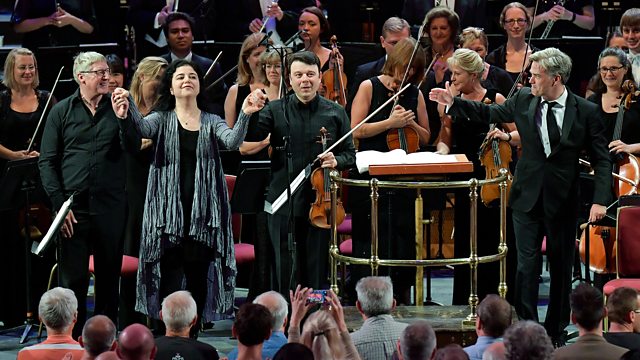
 United Kingdom Prom 22 – Ravel, Auerbach, Debussy: Vadim Gluzman (violin), Nina Bennett, Helen Reeves (sopranos), Andrew Watts (counter-tenor), Tom Raskin (tenor), Andrew Rupp (bass), Crouch End Festival Chorus (chorus master: David Temple), BBC Symphony Orchestra, Edward Gardner (conductor), Royal Albert Hall, London, 31.7.2016. (MB)
United Kingdom Prom 22 – Ravel, Auerbach, Debussy: Vadim Gluzman (violin), Nina Bennett, Helen Reeves (sopranos), Andrew Watts (counter-tenor), Tom Raskin (tenor), Andrew Rupp (bass), Crouch End Festival Chorus (chorus master: David Temple), BBC Symphony Orchestra, Edward Gardner (conductor), Royal Albert Hall, London, 31.7.2016. (MB)

Ravel: Ma Mère L’Oye: Suite
Auerbach: The Infant Minstrel and his Peculiar Menagerie (Symphony no.3 for violin, choir, and orchestra) (BBC co-commission: UK premiere)
Debussy (orch. Jean Roger-Ducasse): King Lear: ‘Fanfare d’ouverture’ and ‘Le Sommeil de Lear’
Debussy: La Mer
The performance of Ravel’s Mother Goose Suite with which this Prom opened was for me its highlight. Friends with whom I spoke at the interval found it on the slow side; for me, it was perfectly judged. The opening ‘Pavane de la Belle au bois dormant’ showed a beautifully measured tread. Its silky-smooth textures – what wonderful playing from the BBC SO under Edward Gardner! – continued into ‘Petit Poucet’, its chaste, or maybe not-so-chaste, passion impossible to resist, especially with such ravishing woodwind solos as heard here. ‘Laideronnette’, Impératrice des pagodes’ sounded more urgent than usual, rather winningly so. I was reminded of the ‘laid’ in ‘Laideronnette’, but not too much. Colourful contrast came in ‘Les Entretiens de la Belle et de la Bête’: faux-naïve magic! The grave nobility of ‘Le Jardin féerique’, not, of course, without its own sensuality, had me wish that we could have heard the whole ballet.
At the close, a woman seated behind me asked the man with her, ‘Was that the modern piece? Have we got that over with now?’ The irony would prove to be that, by comparison, with Lera Auerbach’s new work, The Infant Minstrel and his Peculiar Menagerie, it most certainly was, in all but date. What on earth was the BBC doing co-commissioning such drivel? It was excellently performed, insofar as I could tell, the vocal soloists and Crouch End Festival Chorus singing lustily, even amusingly. Gardner and the orchestra proved equally committed, and a gold medal should go to Vadim Gluzman, whose violin solo (the line of the Infant Minstrel) proved unerringly beautiful of tone and sure of direction. Would that we could have heard him in something more substantial!
The programme certainly did not undersell Auerbach, her fellow poet, Thomas McCarthy writing of her as ‘an artist for whom music is as wide as exile and as intimate as a line of poetry’, and Scene Magazine quoted thus: ‘To say Lera Auerbach is a Renaissance artist is a bit like saying Leonardo da Vinci could multi-task a little bit. Most impressive is the totality of her immense body of work.’ I cannot comment on ‘the totality’, but can say that her middling English verse, or rather that of ‘Erroneous Anonymous’, its debts to Lewis Carroll a little too obvious, was never remotely matched by her derivative, frankly uninspired music. The Overture’s violin solo swiftly invites, or is gatecrashed by, countertenor, soprano, and, mostly, the chorus. There are some reasonably attractive sounds akin to watered-down Szymanowski, but not much else to enjoy in this neo-tonal rambling. The rest is mostly verbal, and I can imagine a child enjoying an edited version of the verse alone, although there is a little sub-Piazzolla writing in an Interlude too; Gluzman and Gardner provided a splendid lilt to the dance rhythms, perhaps more than they deserved. By the time we had reached the fourth number, ‘Lament for a Common Corporant’, and Andrew Watts was informing us of the said corporant – ‘Who likes to rant, to rant, to rant! He rants on all day long! (And it’s a very boring song.)’ – I could only agree, its laboured whimsy notwithstanding.
The four-square word-setting is throughout so obvious, so predictable, that it might have come from a reasonably talented schoolchild: excellent in that case, but as a concert work lasting the best part of three quarters of an hour? Even the open goal of a dig at Donald Trump – ‘I had a little husband, no bigger than my thumb. Didn’t know what to call him, so I called him Donald Trump’ – went for relatively little, and that was not the fault of the performers. I hoped that ‘Guacamole Treatment’ might bring a Peter Mandelson reference, but no, although the vocal line is at times slightly less predictable. As for the tedious, well-nigh interminable sentimentalism of the final number, ‘Child-Wanderer’, once we were through its non-ironically cloying harmonies, I could only repeat once again – for it had already been repeated a few too many times on stage – its final line: ‘Infant Minstrel, are you real?’
The Debussy of the second half never rose to the heights of the Ravel performance. It was difficult to put my finger on why, but mystery was lacking. Perhaps it was not a surprise, then, that it was the brief Fanfare from the King Lear music that came off best: forthright, yet not without a little of the languor largely missing elsewhere. Lear’s Dream sounded attractive enough, but inconsequential. La Mer had plenty of drive, and often welcome clarity – although one would hear far more in, say, a Boulez performance of old. Motivic development, in ‘De l’Aube à midi sur la mer’ was admirably clear, yet in Debussy, one needs to experience the magic with which clarity and ambiguity are revealed to be two sides of the same mystical coin. That first movement’s great climax fell oddly flat, Gardner’s pacing seemingly awry. Orchestral balances proved problematical in ‘Jeux de vagues’, brass too often overpowering the strings. There was a splendid sense of the elemental to ‘Dialogues du vent et de la mer’; thereafter, however, the dialogues’ progress was disconcertingly disjointed. Maybe we should have been better off with more, or all, Ravel.
Mark Berry
